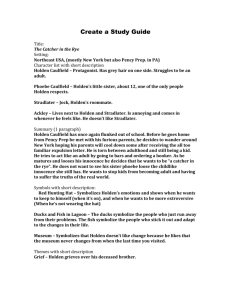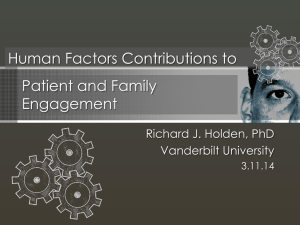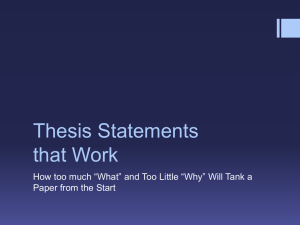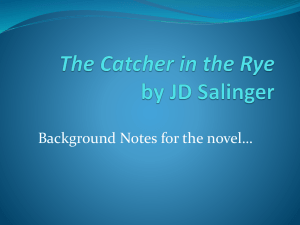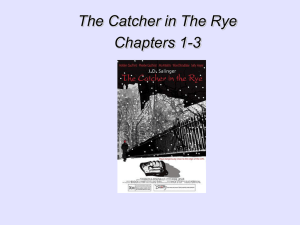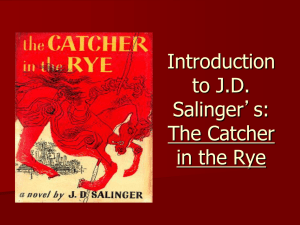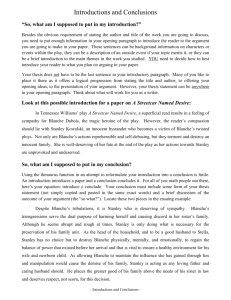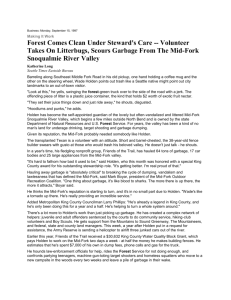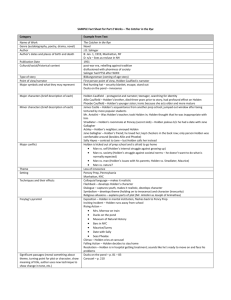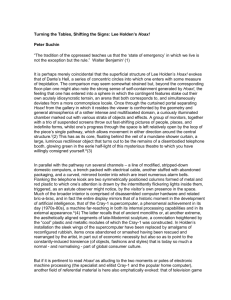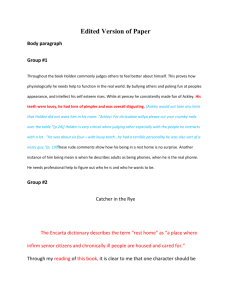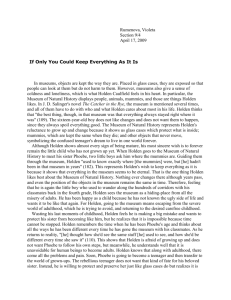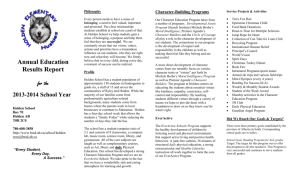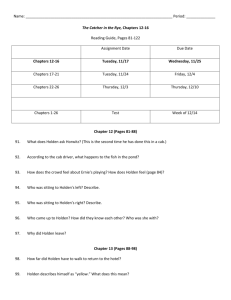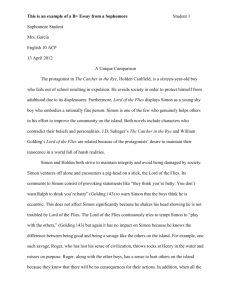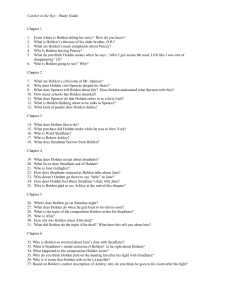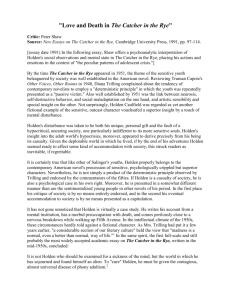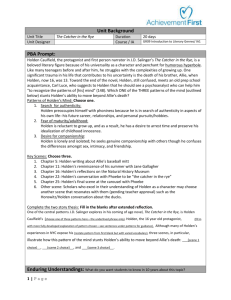McNair`s AP Lit Catcher in the Rye – Literary Analysis Activity Part I
advertisement
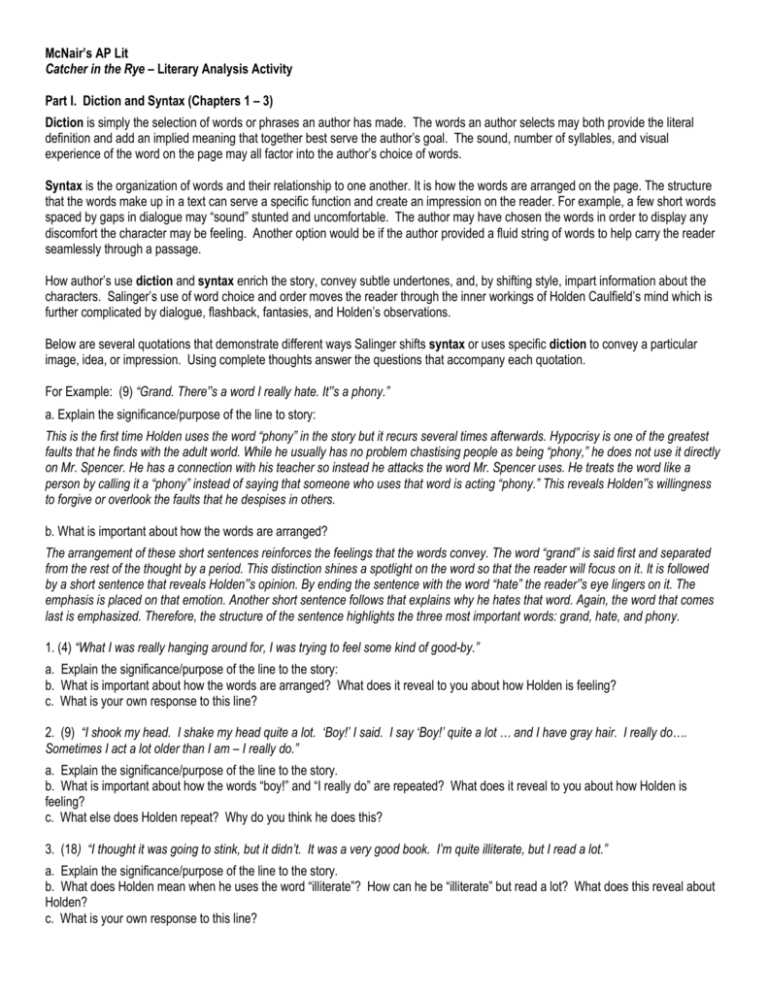
McNair’s AP Lit Catcher in the Rye – Literary Analysis Activity Part I. Diction and Syntax (Chapters 1 – 3) Diction is simply the selection of words or phrases an author has made. The words an author selects may both provide the literal definition and add an implied meaning that together best serve the author’s goal. The sound, number of syllables, and visual experience of the word on the page may all factor into the author’s choice of words. Syntax is the organization of words and their relationship to one another. It is how the words are arranged on the page. The structure that the words make up in a text can serve a specific function and create an impression on the reader. For example, a few short words spaced by gaps in dialogue may “sound” stunted and uncomfortable. The author may have chosen the words in order to display any discomfort the character may be feeling. Another option would be if the author provided a fluid string of words to help carry the reader seamlessly through a passage. How author’s use diction and syntax enrich the story, convey subtle undertones, and, by shifting style, impart information about the characters. Salinger’s use of word choice and order moves the reader through the inner workings of Holden Caulfield’s mind which is further complicated by dialogue, flashback, fantasies, and Holden’s observations. Below are several quotations that demonstrate different ways Salinger shifts syntax or uses specific diction to convey a particular image, idea, or impression. Using complete thoughts answer the questions that accompany each quotation. For Example: (9) “Grand. There‟s a word I really hate. It‟s a phony.” a. Explain the significance/purpose of the line to story: This is the first time Holden uses the word “phony” in the story but it recurs several times afterwards. Hypocrisy is one of the greatest faults that he finds with the adult world. While he usually has no problem chastising people as being “phony,” he does not use it directly on Mr. Spencer. He has a connection with his teacher so instead he attacks the word Mr. Spencer uses. He treats the word like a person by calling it a “phony” instead of saying that someone who uses that word is acting “phony.” This reveals Holden‟s willingness to forgive or overlook the faults that he despises in others. b. What is important about how the words are arranged? The arrangement of these short sentences reinforces the feelings that the words convey. The word “grand” is said first and separated from the rest of the thought by a period. This distinction shines a spotlight on the word so that the reader will focus on it. It is followed by a short sentence that reveals Holden‟s opinion. By ending the sentence with the word “hate” the reader‟s eye lingers on it. The emphasis is placed on that emotion. Another short sentence follows that explains why he hates that word. Again, the word that comes last is emphasized. Therefore, the structure of the sentence highlights the three most important words: grand, hate, and phony. 1. (4) “What I was really hanging around for, I was trying to feel some kind of good-by.” a. Explain the significance/purpose of the line to the story: b. What is important about how the words are arranged? What does it reveal to you about how Holden is feeling? c. What is your own response to this line? 2. (9) “I shook my head. I shake my head quite a lot. ‘Boy!’ I said. I say ‘Boy!’ quite a lot … and I have gray hair. I really do…. Sometimes I act a lot older than I am – I really do.” a. Explain the significance/purpose of the line to the story. b. What is important about how the words “boy!” and “I really do” are repeated? What does it reveal to you about how Holden is feeling? c. What else does Holden repeat? Why do you think he does this? 3. (18) “I thought it was going to stink, but it didn’t. It was a very good book. I’m quite illiterate, but I read a lot.” a. Explain the significance/purpose of the line to the story. b. What does Holden mean when he uses the word “illiterate”? How can he be “illiterate” but read a lot? What does this reveal about Holden? c. What is your own response to this line? Part II. Subtext (Chapters 4 – 6) Subtext is an underlying meaning or implication that relies heavily on the author‘s use of diction and syntax. It often involves subtle shifts in tone or meaning that may result in irony or contradiction. Much of the information about Holden and the other characters is relayed indirectly through Holden‘s observations and thoughts. Directions: Each of the quotations below reveals something about Holden’s personality, others’ personalities, or his opinions about others that he has not explicitly (or directly) stated. Explain the significance/purpose of the line to story. It might be helpful to reread the scene that includes the quotation. Be sure to make your answers thoughtful and thorough, rather than just one brief sentence. Use complete sentences. For Example: (29) “I hate the movies like poison, but I get a bang imitating them.” Explanation: Holden mentions that he hates movies before imitating a scene because he feels insecure about doing something that may seem hypocritical. To make playing around okay, he feels he must cover himself with this statement. 1. (28) “I didn’t answer him right away. Suspense is good for some bastards like Stradlater. ‘What on?’ I said.” Explanation: 2. (31) “Old Stradlater was putting Vitalis on his hair. My Vitalis.” Explanation: 3. (36) “You’d think he was doing you a big favor.” Explanation: 4. (37) “Old Ackley parked himself in my room, just for a change.” Explanation: 5. (38) “He got leukemia and died when we were up in Maine, onl July 18, 1946.” Explanation: 6. (40) “Some things are hard to remember.” Explanation: 7. (42) “I ignored him. I really did. I went right on smoking like a madman.” Explanation:

